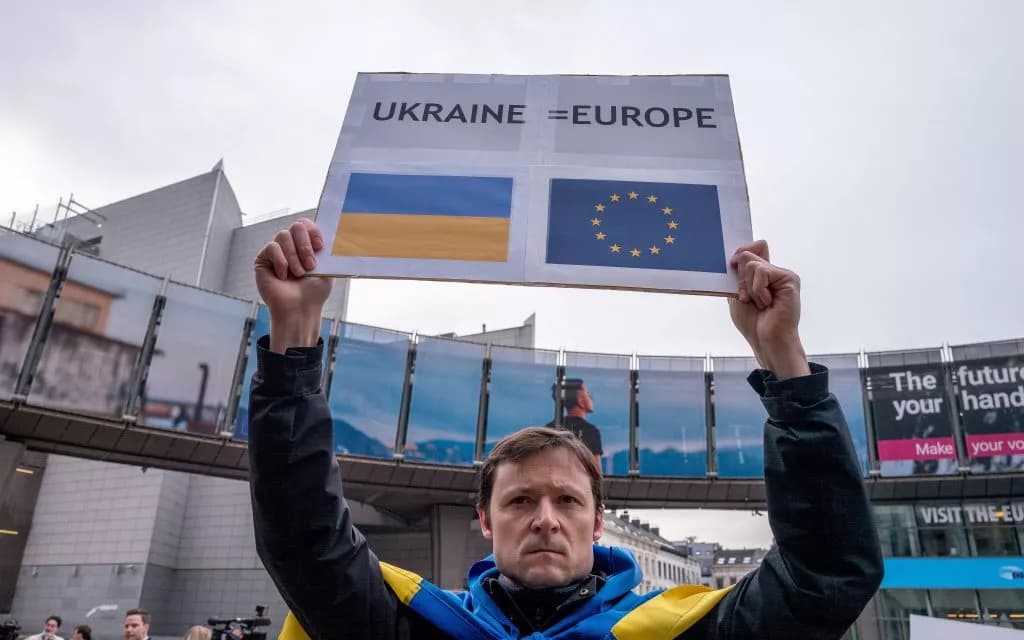Eugene Czolij: EU must wholeheartedly grant Ukraine candidate status for EU membership

BRUSSELS, BELGIUM - MARCH 01: A demonstrator holds a banner with messages in support of the Ukrainian people during a demonstration in front of the European Parliament on March 01, 2022 in Brussels, Belgium. Hundreds of people gathered in front of the European Parliament to show their support for the Ukrainian people, including dozens of Ukrainians living in Belgium. The President of the European Parliament, Roberta Metsola, accompanied by MEPs gave a speech to those present in which she made clear the European Union's support for Ukraine and welcomed Ukraine's application for EU membership. On February 24, 2022 Russia began a large-scale attack on Ukraine, with explosions reported in multiple cities and far outside the restive eastern regions held by Russian-backed rebels. (Photo by Omar Havana/Getty Images)
Editor’s Note: The opinions expressed in the op-ed section are those of the authors.
On 23-24 June, a European Summit will be held in Brussels where the European Council, composed of the heads of state of the 27 member states of the European Union, and the Presidents of the European Council and the European Commission, will be addressing the application for EU membership that Ukraine submitted on Feb. 28.
Article 49 of the Treaty on European Union, also known as the Maastricht Treaty, provides that:
“Any European State which respects the values referred to in Article 2 and is committed to promoting them may apply to become a member of the Union […].”
Ukraine not only respects and promotes the European values referred to in the Maastricht Treaty, but it has also been defending them since 2014 with incredible courage and heroism against an authoritarian regime with imperialist ambitions bent on annihilating such values.
That is why, on June 17, the President of the European Commission Ursula von der Leyen rightly posted on Twitter that: “Ukrainians are ready to die for the European perspective.”
After assessing Ukraine’s application for EU membership “in light of the three sets of criteria to join the EU agreed by the European Council: political criteria, economic criteria and the ability of the country to assume the obligations of EU membership (EU acquis)”, on June 17, the European Commission stated that:
“The European Commission has found that Ukraine overall is well advanced in reaching the stability of institutions guaranteeing democracy, the rule of law, human rights and respect for and protection of minorities; has continued its strong macro-economic record, demonstrating a noteworthy resilience with macroeconomic and financial stability, while needing to continue ambitious structural economic reforms; and has gradually approximated to substantial elements of the EU acquis in many areas.
On this basis, the Commission recommends that Ukraine be given the perspective to become a member of the European Union. It should be granted candidate status on the understanding that steps are taken in a number of areas.”
The fact that Ukraine has reached this stage despite Russia’s incessant efforts to derail Ukraine’s Eurointegration process, including by invading Crimea and eastern regions of Ukraine in February 2014 and launching, eight years later, on 24 February 2022, a full-scale genocidal war against Ukraine – that has already caused material damages estimated at over $600 billion dollars – is truly awe-inspiring.
On the day that the forthcoming European Summit is scheduled to begin, Ukraine will have been defending its territorial integrity and stopping Russia from continuing to proceed further westward for 120 days. This has most deservedly earned Ukraine the admiration of the international community.
On May 16, during a meeting of the EU Council of Foreign Ministers, Ukraine’s Minister of Foreign Affairs Dmytro Kuleba offered some very concrete examples of benefits to Ukraine becoming a member of the EU by declaring that:
“We will make a significant contribution to Europe's economic development. We will guarantee European food security. We will accelerate Europe's "green" transition by exporting Ukrainian green hydrogen, biogas and wind energy. Together with you, we will promote the digitalisation of Europe. With the strongest and most experienced army in Europe, we will significantly strengthen Europe's security. We are already doing this, defending our part of Europe and dying for the values we share with you.”
Pursuant to a recent assessment by SecDev, a research and analysis think-tank in Ottawa, Ukraine’s impressive resources in energy, minerals, and agriculture explain Russia’s strong imperialistic appetite for Ukraine. Indeed, according to that assessment, Ukraine: (a) may rank second in Europe in natural gas deposits with 1.1 trillion cubic meters of proven reserves; (b) has deposits of 117 of the 120 most-used industrial minerals whose total value ranges between $3 trillion and $11.5 trillion; and (c) exported almost $28 billion of agricultural products in 2021, and accounted for 50% of the global supply of sunflower seed and safflower oil, 18 % of barley, 16 % of corn and 12 % of wheat.
It is crystal clear that the European Council must wholeheartedly welcome Ukraine by granting it candidate status for EU membership during the upcoming European Summit. Any action short of this by any of the 27 EU member states will only undermine and weaken the very foundation of the EU.
In that sense, this European Summit is more of a test for the EU than for Ukraine, as it is obvious that Ukraine is a European state which belongs in the EU.










